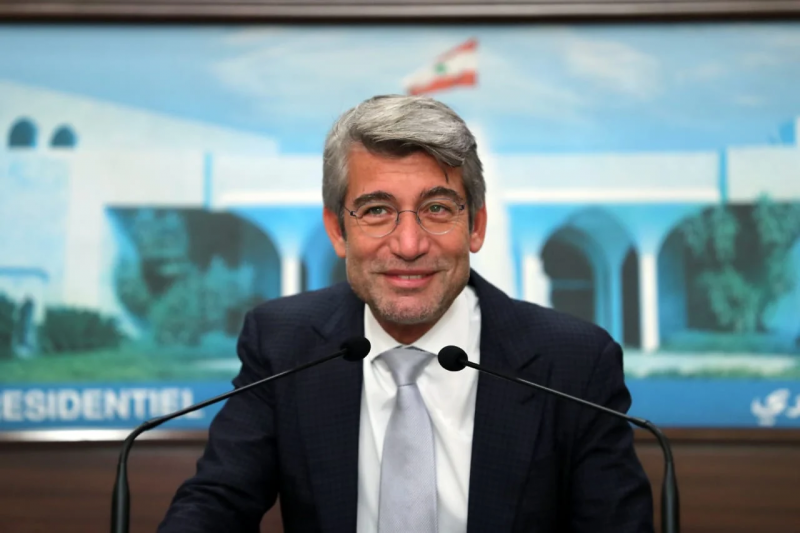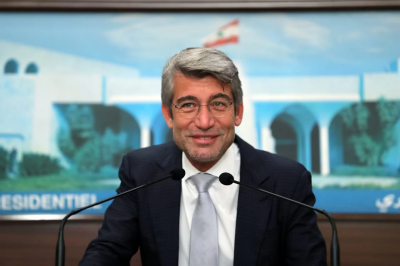The Minister of Energy and Water in the caretaker government, Walid Fayyad, pointed out that "after the consortium of Total, ENI, and Qatar Energy submitted a request for a drilling license in block number 9, which was approved by the Petroleum Authority and the Ministry of Energy, work began and continued according to the timeline submitted with the drilling license request."
During a conference on oil and gas at the Engineers Syndicate in Tripoli, he explained that "currently, drilling is at a depth of 1700 meters below the water surface, and at a depth of 1800 meters below the seabed, equivalent to 3500 meters below the water surface, meaning that the extraction depth exceeds the height of Qurna al-Suda, the highest peak in the Lebanese mountains."
Fayyad revealed that "next week, Lebanon will witness the final stage of the current exploration process, where we will come into contact with the layers of the potential reservoir. At this stage, we will expect the presence of hydrocarbon rocks that we can analyze through measuring devices and state-of-the-art equipment, reaching a potential depth of 4300 meters to measure the properties of the rocks and the nature of the materials present at the new depth."
He indicated that "if there are significant hydrocarbon materials, we would move to the phase of experimental extraction based on the preliminary results expected to be released by the end of October 2023, regarding the discovery or lack thereof," stressing that "if things proceed without any technical obstacles related to the geological reality and the nature of the underground layers, we will have taken a significant step towards resolving our economic and social crises."
Additionally, he mentioned that "detailed information on whether there are commercial quantities or not will be released at the end of this year, once we have analyzed all the data and information coming to us from the bottom of our territorial waters, at which point a detailed and estimated report on what exists and what can be expected will be released."
Fayyad confirmed that "no one can currently assess the status of the drilling, as we are entering new layers that enable us to map the geological similarities between the geological layers in the occupied Palestinian sea and the Lebanese sea, specifically at the site of the Qana well. This map has not been discovered by anyone, and there is no equivalent in the territorial waters."
He noted that "this is the first well to be drilled in this area, and the first access to such layers in the region. If the rate of similarity is high and recurring in the drilling area, we would be facing a discovery. After that, we need to analyze the data and studies from inside the well to determine whether this discovery is commercial or not."
He considered that "the discovery itself is an achievement for Lebanon. Even if the data does not indicate that there is a commercial discovery, the accumulated data lays the foundation for other discoveries in the Qana field and block number 9, initiating successive steps towards a commercial discovery. Therefore, this month is a pivotal month to confirm whether there is an oil discovery or not."
In this context, Fayyad urged everyone at this stage to "exercise caution in launching predictions and expectations, as the data is still coming in, and we are still in the process of gathering information, after which we will scientifically analyze it and inform the public." He pointed out that "the change in the drilling location occurred at the beginning of the drilling within the first 50 meters, which is something normal that saved us days of waiting and reduced costs for the exploring company."
He explained that "this change does not negatively affect the outcome of the drilling but rather strengthens the foundations of the well on solid, cohesive rock."
He added, "The technical team in the ministry and the Petroleum Authority monitors all data 24 hours a day in real-time with the drilling rig. We have sufficient Lebanese human resources capable of accompanying and analyzing the results."
He highlighted that "over several terms of successive energy ministers, there has been a strong emphasis on imposing a quota of Lebanese labor, not less than 80 percent of workers, administrators, and engineers, which is a high percentage to encourage Lebanese participation in extracting their national resources. This workforce includes training, qualification, and exercising the relevant personnel to keep pace with the global companies in this field."
The Energy Minister pointed out that "once we confirm the discovery, we proceed to the development and production phase, which is preceded by a two-year phase to prepare the infrastructure for gas, which cannot store commercial quantities, but must ensure a commercial market for it before starting extraction, in cooperation between the authority and the ministry, so that we can then choose the most suitable method for developing the field—how many wells we will drill along with all their appurtenances, as well as the issue of exporting abroad and local consumption."
He noted that "this will require about three years to finalize these matters, after which we can proceed to implementation." He emphasized that "at that time, we can congratulate ourselves that Lebanon has become an oil country with additional assets and is on the road to economic recovery from its crisis," asserting that "we need the cooperation of all efforts, and we require support from all relevant ministries," expressing hope that the government would "provide the necessary human resources at that time to meet the oil requirement."
He continued, "None of this would have happened without the perseverance to establish a cohesive legal framework, which has been completed in two parts: the first in 2010 with the ‘oil extraction decrees,’ and then in 2017 with the issuance of the block division decree and the environmental decree. The most important achievement is the historical geostrategic achievement of the maritime border demarcation in October 2021."




